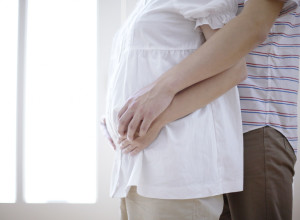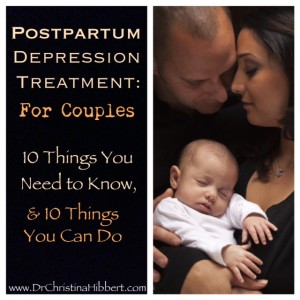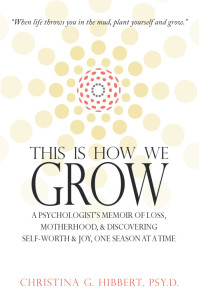) Thus, postpartum depression treatment needs to focus on both members of the couple in order to heal not only the individuals, but the couple’s relationship as well.
The Couple’s Relationship & PPD
While pregnancy or postpartum depression can definitely impact a couple’s relationship, the health of a couple’s relationship can also impact whether or not they develop a perinatal mood or anxiety disorder (PMAD). In fact, according to research:
8) Less secure attachment to one another and dissatisfaction with partner support is associated with higher rates of Postpartum Depression and PTSD.[vi]
9) Partner support is associated with improved outcomes for postpartum depression.
10) And, on the flip side, poor partner support is the number one non-biological predictor of PPD.
“What Does All This Mean?”
Together, these things mean that it’s tough having a baby—that your relationship will change, and that it can be a great challenge.
Considering the incredible stress of pregnancy and postpartum, it’s no wonder many couples feel irritated, frustrated, fearful, angry, and distant from one another after the baby comes. Considering the levels of sleep deprivation, life change, and the coping skills required to deal with all these things, it’s no wonder arguments, trouble communicating, and struggles with problem-solving are so common.
But, couples, you don’t have to struggle on your own. You don’t have to let your relationship become swallowed up in this crazy postpartum experience. You can choose to work on it. As a four-time PPD survivor who’s been married nearly 18 years, trust me, I know it’s not at all easy. But, I can attest: It is worth it. And, with time, patience, and hard work, you can not only heal, but your relationship can become stronger if you choose to let it.
“What Can We Do?”: Healing Postpartum Couples
How can you stick together and heal from your postpartum experience? Here are ten suggestions to try today.
1) Recognize & acknowledge pregnancy and postpartum for the difficult time it is. Give yourselves credit for all you’re already doing, and give yourselves time to adjust and work through.
2) Learn all you can about pregnancy and postpartum depression and anxiety, in mothers and in fathers. The more you know, the more you will see that you are not alone and that these symptoms are not your fault. Partners who learn about this together develop greater compassion and know better how to support one another.
3) Find qualified professionals to help treat the maternal or paternal depression. Yes, dads—if you need help too, then seek it. There are counselors, support groups, medications, and alternative treatments out there that can make a huge difference in your healing. Do not quit until you find someone who is
able to give you both the help you need.
4) Talk and listen to one another’s feelings. This may seem difficult, but you must try to understand one another’s
points of view. Ask yourself, “How  might I feel about this if it didn’t affect me at all?” This can help you see the other person without seeing what they’ve “done” to you.
might I feel about this if it didn’t affect me at all?” This can help you see the other person without seeing what they’ve “done” to you.
5) Plan for some time alone as a couple doing activities that help build your relationship. It doesn’t have to be anything fancy. Sit and talk. Watch a movie together. Play a game. Arrange for a
sitter, or spend time alone after the baby is asleep. Just be together, one-on-one. You need it more than you realize.
6) Improve overall communication by talking about things that are not related to PPD or the baby. Talk about your day, family, friends. Look for positive conversations to have, and then have them.
7) Recognize you’re not alone in the struggles you’re facing as a couple, and that help is available. Some of the common struggles postpartum couples face include: Identity & Role changes, Communication difficulties, Grief/loss, Parenting challenges, Conflict resolution and Problem-solving skills, and trouble with Sleep, Intimacy, and Sex. Seeking help, together, from an older, trusted couple, faith counselor, or therapist can help resolve these issues. Whatever you do, choose to work on these things and seek help before they become too hard to change.
8) Try couples therapy to work on relationship issues. Research shows couples therapy benefits couples in the following ways:
- The couple works on their relationship and not just individual issues.
- It helps mom feel like this is not just her problem.
- Her partner is able to take a role in treatment and take an active support role.
- Dad/partner can also receive support and healing.
- The therapist can assess the couple’s relationship directly—no misunderstandings.
- The therapist can observe interactions with the baby, bonding, attachment, and cooperation with each other on parenting issues.[vii]
9) When it comes to intimacy, be patient, respectful, and loving. Since it can often take some time for things to feel “normal” again (especially when one partner has PPD), express your love for each other in other ways. Say, “I love you.” Hold each other. Work on getting your intimacy back to where you want it to be (couple’s or sex therapy are great ideas too).
10) Remember, you are both going through this, even if your experiences are different. Choose to turn toward each other instead of away. When you need space, take a time out. But, come back together again. Go through it together.
Bottom Line:
Having a baby is hard. Not just on mom. Or on dad. But on your relationship too. Hang in there. Be patient with each other. Love each other. And your relationship will not only heal, it will be strengthened.

Clinical Psychologist, Mom of 6, Postpartum Couples DVD Producer, Non-Profit Founder, and expert on Parenting, Women’s Emotions, Pregnancy & Postpartum, and Grief & Loss, Dr. Christina Hibbert loves songwriting, learning, and teaching what she learns. A 4-time PPD survivor, Dr. Hibbert and her husband of almost 18 years have made it through and can tell you, “It’s worth all the trouble, so hang in there!”

Don’t miss a thing! SUBSCRIBE to my email list, below, and please “Like” my Facebook page for inspiration on the topics that interest you most!
Related Articles/Posts:
Postpartum Depression Treatment: For Dads & Partners
Postpartum Depression & Men: The Facts on Paternal Postnatal Depression
Postpartum Depression Treatment
Pregnancy & Postpartum Emotional Health
Postpartum Depression Treatment: Sleep
PPD Treatment: Psychotherapy
PPD Treatment: Medication
PPD Treatment: Complimentary & Alternative Modalities
PPD Treatment: Self-Help
In Praise of Fathers: 10 Research-Based Ways Dad Impact Kids for the Better
16 Things I’d Like My Postpartum Self to Know, 16 Years & 6 Kids Later
Postpartum Survival Mode
Weather the Storms Together: 4 Ways to Strengthen Families Through Times of Stress
“Mommy Fails” and Mother’s Day: 3 Messages Every Mom Needs to Hear
“This is How We Grow” Summer Book Club: Join and Preview Chapters of My New Book!
Postpartum Couples DVD Link
Postpartum Help:
Postpartum Support International
Postpartum Dads
Online PPD Support Group

Be sure to check out Dr. Hibbert’s Amazon Bestseller, This is How We Grow–
Join my This is How We Grow Personal Growth Group!
FREE. Online. Growth. What more could you ask for?
Don’t miss a thing!
You may manage your subscription options from your profile
Resources
[i] Goodman, J.H. (2008). Influences of Maternal Postpartum Depression on Fathers and on Father-Infant Interaction. Infant Mental Health Journal; Vol. 129, Issue 6: 624-643.
[ii] Isles, J., Slade, P., & Spiby, H. (2010). Posttraumatic Stress Symptoms and Postpartum Depression in Couples After Childbirth: The role of partner support and attachment. Journal of Anxiety Disorders; Vol. 25, Issue 4, May: 520-530.
[iii] Goodman, J.H. (2004). Paternal PPD, its Relationship to Maternal Depression, and Implications for Family Health. Journal of Advanced Nursing; Vol. 45, Issue 1, Jan: pp. 26-35.
[iv] Letourneau, N.L, et. al. (2012). Postpartum Depression is a Family Affair: Addressing the impact on mothers, fathers, and children. Issues in Mental Health Nursing; 33:445-457.





